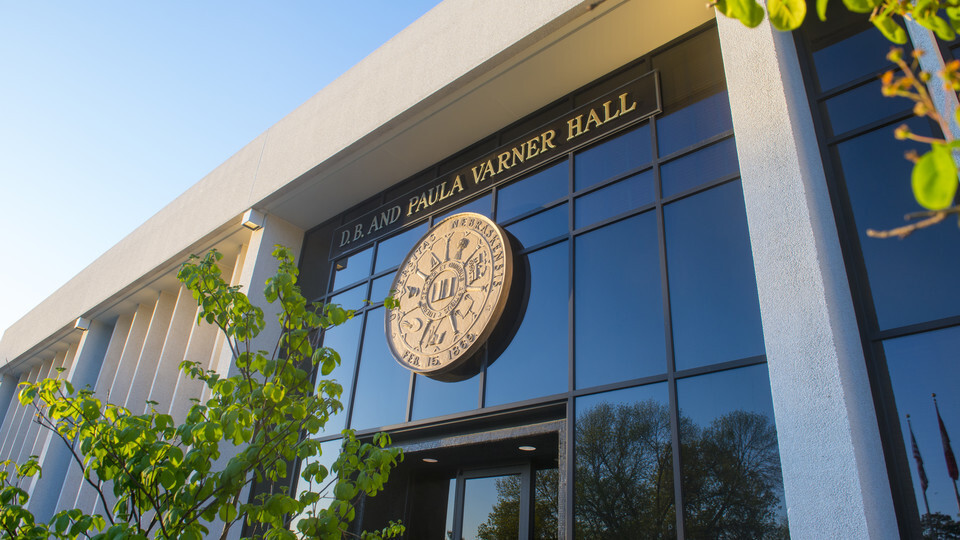
The University of Nebraska Board of Regents on June 19 unanimously approved the NU system’s 2020-21 operating budget, part of a multi-year plan to address fiscal challenges presented by COVID-19 while also laying the groundwork for future growth and success across the campuses.
“This budget plan puts our students and the people of Nebraska first,” President Ted Carter said in reviewing the proposed budget for regents. The affordability, accessibility and quality of an NU education has been “our true North Star” as university leaders have worked collaboratively to manage an unprecedented level of unpredictability during the pandemic, Carter said.
Chancellor Ronnie Green outlined budget reductions the University of Nebraska–Lincoln is facing in a June 19 message to campus. Learn more here.
Despite the challenges — notably $43 million in spending cuts that will be necessary over the next three years to balance the budget — proactive decisions to serve the needs of students and the state during an uncertain time have put the university in a position of relative strength, Carter said. He credited a recent surge in applications from first-time Nebraska students to a “bias for action” in making enrollment the NU system’s highest strategic priority.
For example, the university will increase its investment in need-based financial aid, freeze tuition rates across the board in the next biennium, and reduce and standardize across campuses most of its resident, undergraduate online tuition rates. Those steps – along with others taken by the campuses to expand accessibility and flexibility for students – have aimed to send a message of care and concern to the people of Nebraska, Carter said. And since mid-April, when applications from first-time Nebraska students were behind where they were in 2019, applications have surged by 2,900 and are now 9% ahead of last year.
While much work remains between now and the start of the fall semester, and while enrollment among non-Nebraskans is more uncertain, the positive trend means the university’s fiscal picture is much better than it would have otherwise been.
“We will be a university system that gets this right,” Carter said.
Regents commended the diligent fiscal planning being done across the university system as challenges created by COVID-19 have evolved in real time. Because of that, the university will be in a strong position to grow and meet the needs of Nebraska’s workforce and economy going forward, regents said.
“We’re not paralyzed; we are taking action,” said Chairman Jim Pillen of Columbus. “(The budget) is exclusively, 100 percent focused on students, and that is really exciting.”
Key elements of the three-year budget plan outlined by Carter include:
A two-year, across-the-board tuition freeze in the 2021-2022 and 2022-23 academic years. The state’s support helped keep tuition increases minimal in the current two-year budget cycle, including a 2.75 increase for 2020-21 that was approved by the Board last year.
Creation of the Nebraska Promise financial aid program, which will cover full tuition costs for Nebraska students with family incomes of $60,000 or less. The program is expected to cover 1,000 additional low- and middle-income students.
No increase in the salary pool for non-unionized faculty and staff for 2020-21, but plans to invest in salary increases each of the following two years, so that all employees, bargained or not, will be eligible for a 4.5 percent total merit-based increase over the three-year period.
$43 million in permanent state-aided spending cuts across the system, the result of lost revenue and increased expenses brought on by COVID-19. The revenue declines include a projected decline in tuition revenue from nonresident and international students.
NU’s cuts will be spread over three years to help mitigate the pain: 0.2 percent in 2020-21, 1.6 percent in 2021-22 and 2.6 percent in 2022-23. NU’s Central Administration office will take a 10 percent cut to its budget, while each chancellor will lead a campus-specific budget reduction process.
A planned 2 percent annual increase in state support in the next biennium. The modest increase reflects the university’s commitment to being a good partner to Gov. Pete Ricketts, Appropriations Committee Chairman John Stinner and the Legislature as they work through fiscal challenges at the state level. The Board will consider NU’s 2021-23 budget request to the state at its August meeting.
$20 million in the next biennium to advance strategic priorities of the president and chancellors, like student access and success, faculty compensation, diversity and inclusion, and building renewal and repair. These will be among the priorities lifted up in Carter’s five-year strategic plan, to be unveiled at the Aug. 14 Board meeting in conjunction with his formal installation as NU’s eighth president.
The board also approved the 2020-21 operating budget for the Nebraska College of Technical Agriculture. Given its lean budget, no reductions are planned for NCTA – a signal, Carter said, of the university’s commitment to maintaining strong programs to meet the needs of Nebraska agriculture.







